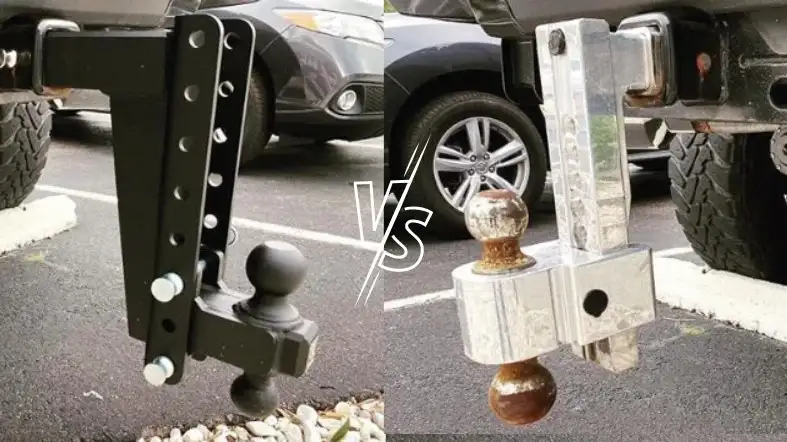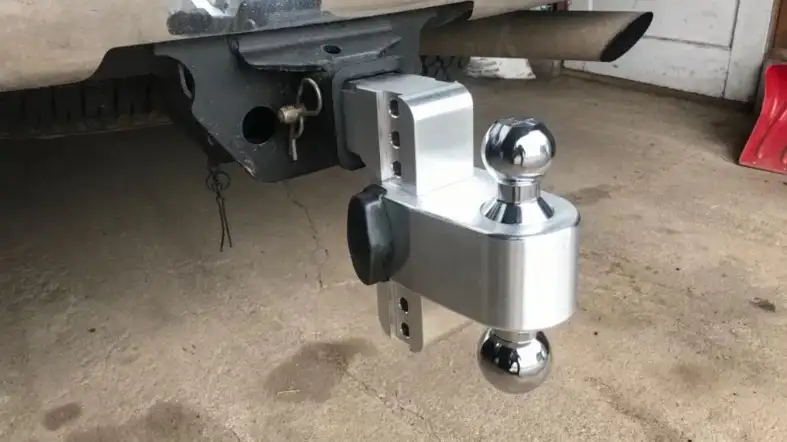When it comes to choosing a hitch for your trailer or recreational vehicle, one of the main decisions you will have to make is whether to go with an aluminum or steel hitch.
Both materials have their own unique set of advantages and disadvantages, and the one that is right for you will depend on your specific needs and preferences.
This article will help you to choose between an aluminum or steel hitch according to your specific needs and preferences.
Is An Aluminum Hitch Better Than Steel?
It depends on the specific application and use case.
Aluminum is a lighter and more corrosion-resistant material than steel, which can be an advantage in certain situations.
For example, an aluminum hitch may be a better choice for a lightweight vehicle or for use in coastal areas where rust is a concern.
However, steel is generally stronger and more durable than aluminum, making it a better choice for heavy-duty applications or for use in areas where the hitch will experience a lot of stress.
Ultimately, the best choice between aluminum and steel hitch will depend on the specific requirements of the application.
The pros and cons of aluminum hitches
When it comes to choosing a hitch for towing a trailer, one material option that is often considered is aluminum.

While aluminum hitches have their benefits, there are also some potential drawbacks to consider.
Here, we will examine the pros and cons of using an aluminum hitch for towing.
Pros:
1. Lightweight:
Aluminum hitches are significantly lighter than steel hitches, which can be beneficial for vehicles that are already carrying a heavy load or are smaller and not meant to carry as much weight.
The lighter weight of the hitch also makes it easier to install and remove.
2. Corrosion-resistant:
Aluminum is resistant to rust and corrosion, which makes it a good option for people who live in areas with high humidity or saltwater exposure.
This means that the hitch is less likely to rust or corrode over time, which can lead to a longer lifespan and better performance.
Cons:
1. Expensive:
Aluminum hitches are generally more expensive than steel hitches, which can be a drawback for people who are on a budget.
2. Potentially weaker than steel:
While aluminum is generally strong enough for most towing needs, it is not as strong as steel and may not be suitable for heavy-duty towing.
This means that it may not be the best choice for people who need to tow large loads or are planning on towing frequently.
The pros and cons of steel hitches
Steel hitches, also known as tow bars, are a popular choice for towing vehicles due to their strength and durability.
They allow you to easily attach a trailer or other vehicle to the back of your car or truck and can handle heavy loads without breaking or bending.
However, like any tool or piece of equipment, steel hitches have their own set of pros and cons that need to be considered before making a decision to use one.
Here, we will explore the advantages and disadvantages of using a steel hitch to help you determine if it is the right choice for your needs.
Pros:
1. Durability:
Steel hitches are known for their durability and strength. They are able to withstand heavy loads and rough terrain, making them ideal for use in towing vehicles.
2. Relatively inexpensive:
Steel hitches are generally more affordable compared to other materials such as aluminum or carbon fiber.
3. Wide availability:
Steel hitches are widely available in the market, making it easy for consumers to find and purchase them.
Cons:
1. Heavy:
Steel hitches are significantly heavier compared to other materials such as aluminum. This can affect the overall weight and performance of the towing vehicle.
2. Prone to rust:
Steel hitches are prone to rusting, especially when exposed to moisture and harsh weather conditions. This can weaken the hitch and reduce its lifespan.
3. Lower towing capacity:
Steel hitches typically have a lower towing capacity compared to other materials such as aluminum, which can limit the types of loads that can be safely towed.

FAQs
What Are The Main Differences Between Aluminum And Steel Hitches?
Aluminum hitches are generally lighter in weight and more corrosion resistant than steel hitches.
They are also easier to install and remove, as they do not require as much force to secure or loosen.
Steel hitches tend to be stronger and more durable, able to withstand higher weight capacities and rough terrain.
How Does The Weight Of The Hitch Affect Its Performance?
The weight of the hitch can affect its performance in a few ways.
A lighter hitch may be easier to install and remove, but it may also have a lower weight capacity and be less able to handle heavy loads.
On the other hand, a heavier hitch may be more difficult to install and remove, but it may also be able to handle heavier loads and be more durable in rough conditions.
Can I Use An Aluminum Hitch For Towing A Large Trailer Or Camper?
It depends on the specific weight and size of your trailer or camper, as well as the weight capacity of the aluminum hitch.
It is generally recommended to use a steel hitch for larger and heavier trailers or campers, as they tend to have higher weight capacities and be more durable.
if you are planning to tow a smaller or lighter trailer or camper, an aluminum hitch may be sufficient.
What Are The Maintenance Requirements For Aluminum And Steel Hitches?
Both aluminum and steel hitches require regular maintenance to ensure they are functioning properly.
This includes checking and tightening bolts, lubricating moving parts, and inspecting the hitch for any signs of wear or damage.
Aluminum hitches may require less maintenance due to their corrosion resistance, but they still need to be checked and maintained on a regular basis.
Can I Use An Aluminum Hitch With A Steel Trailer?
Yes, you can use an aluminum hitch with a steel trailer as long as the weight capacity of the hitch is sufficient for the weight of the trailer and its contents.
It is important to make sure the hitch and trailer are compatible and properly secured to prevent any accidents or damage while towing.
Conclusion:
In conclusion, aluminum hitches can be a great alternative to steel hitches for those looking for a lightweight and corrosion-resistant option.
It is important to consider the specific needs and capabilities of your vehicle, as well as the weight and size of the load you will be towing.
Ultimately, both aluminum and steel hitches have their own unique benefits and drawbacks, and the best choice for you will depend on your individual circumstances.
